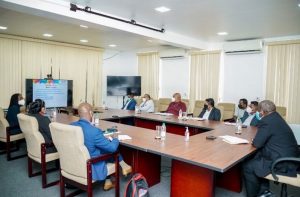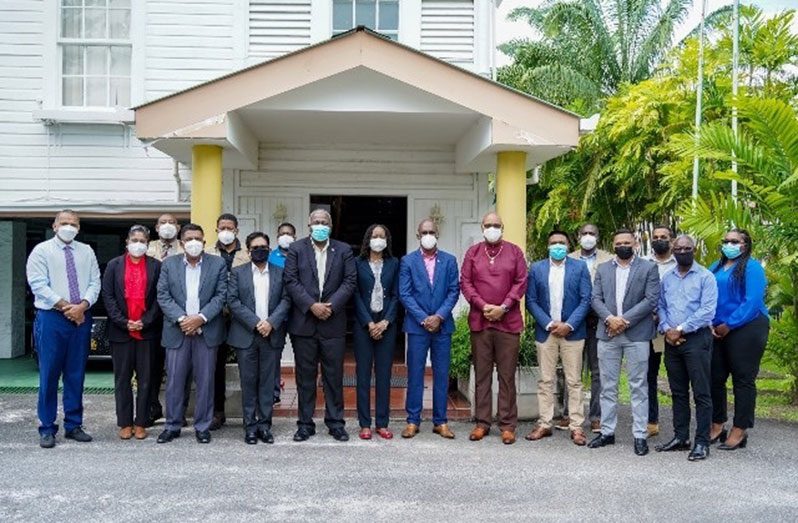–among recommendations are moratorium on loans, relocation of communities
PRIME Minister, Brigadier (Ret’d) Mark Phillips and several other government ministers were, on Wednesday, briefed on some of the preliminary findings of the Detailed Damage Sector Assessment (DDSA) on flooding in Guyana, during a meeting with the Executive Director of the Caribbean Disaster Emergency Management Agency (CDEMA), Elizabeth Riley.
Present at the meeting were the Minister of Health, Dr. Frank Anthony; Minister of Finance, Dr. Ashni Singh; Minister of Agriculture, Zulfikar Mustapha; Minister of Public Works, Juan Edghill; Minister of Regional Development and Local Government, Nigel Dharamlall and Minister of Natural Resources, Vickram Bharrat.
The DDSA covered assessments and analysis across seven sectors, namely health, water and sanitation, infrastructure and housing, agriculture, social services, and shelter and mining in Regions Two, Five, Six, Seven and 10.

During the meeting, Riley gave a presentation outlining some of the key preliminary findings and recommendations for each of the respective sectors covered under the DDSA.
These were categorized according to needs in the immediate, medium and long term and included suggestions such as relief and supplies for farmers, psychosocial support for affected families and social programmes to assist families in getting back on their feet.
The ministers were given the opportunity to offer comments and suggestions to CDEMA, and also seek guidance and advice on the way forward towards recovery.
Minister Edghill asked about international best practices for how to prioritise recovery where infrastructure is concerned. Minister Mustapha and Dharamlall also had similar concerns pertaining to their respective sectors.
Noting that the report will only cover assessments in five regions, notwithstanding all ten regions having been affected, Dr. Singh noted that there was need for extrapolated data to ensure there is not an underestimation of the full impact of the flooding, which has been one of the worst in Guyana’s history.
Prime Minister Phillips extended Guyana’s gratitude to CDEMA for carrying out the critical assessment.
“We are happy to have CDEMA by our side to work through this difficult period,” the Prime Minister related.
Prime Minister Phillips described the meeting as a success, given the useful exchange of information between the CDEMA team and the ministers responsible for the various sectors assessed in the DDSA.
Riley echoed the sentiments of the Prime Minister and also deemed Wednesday’s meeting a success.
“We talked about the critical findings and made specific recommendations on how we are going to support the Government of Guyana going forward, particularly in the area of recovery. It was a very successful meeting,” Riley said.
The DDSA is a result of an agreement between CDEMA and the Civil Defence Commission (CDC) which falls under the Office of the Prime Minister.
The DDSA is the fourth stage in the CDEMA Damage Analysis and Needs Assessment (DANA) continuum for disasters. The full DDSA report is expected by July 10, and will be used to guide decision-making on the way forward in Guyana.
Director-General of the CDC, Colonel Kester Craig said that following the completion of the DDSA, the information will be used to inform a Post Disaster Needs Assessment (PDNA) which is the next stage in the continuum; this will look at the socio-economic impact in a broader way.
Aside from the seven sectors, the DDSA also looked at the coordination of flood response. Riley commended the CDC for the work it has been doing thus far as relates to managing the response.
“One of the very good findings of the DDSA is that the CDC under the leadership of Colonel Craig has done an excellent job with the overall coordination thus far,” Riley commented.
The CDC and other necessary agencies will begin addressing certain immediate needs outlined in the DDSA.
“There are immediate actions that we would have already identified and would be taking to improve our response such as the improved response in the regions and community levels in areas of water contamination and health responses, provision of food supplies, and coordination management,” Colonel Craig said.
In a prior engagement also on Wednesday, the Director-General said: “The intention is not only to report on it [findings], but to use this prelim report to improve our responses. We will definitely be reaching out to the various agencies, ministries, regions to ensure these mechanisms are implemented to ensure improved services to our citizens. We still have work to do.”
Moratorium on loans and grants for farmers, the need for relocation of some communities, the establishment of septic tanks and a revision of building codes are some of the preliminary recommendations stemming from the DDSA.
The need for social services such as psychosocial support, welfare to help families sustain themselves and specific infrastructure rehabilitation were also highlighted.



.jpg)









